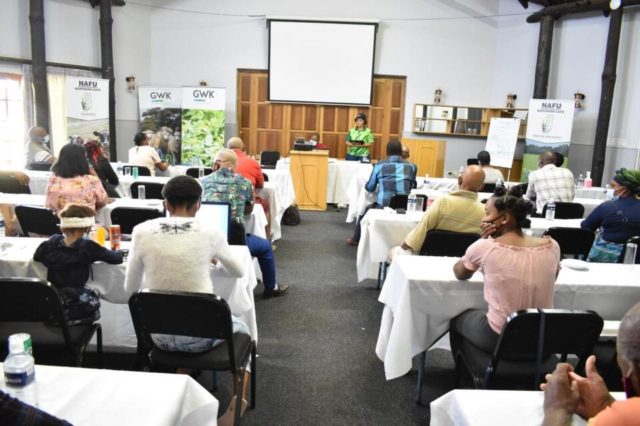MEC Mase Manopole was speaking at the National African Farmers Union (Nafu) annual general meeting
THE NORTHERN Cape MEC for Agriculture, Environmental Affairs, Land Reform and Rural Development, Mase Manopole, said that her department’s provincial climate change adaptation strategy is investigating the impact of rising sea levels on the quality of groundwater.
Manopole was speaking at the National African Farmers Union (Nafu) annual general meeting that took place at Kalahari Lodge in Kimberley on Tuesday and Wednesday.
She pointed that if water sources became more saline, they would not be suitable for drinking purposes.
“This would be a big challenge for the Province, which is already a water-stressed province,” said Manopole.
“As agriculture, we need to implement a strategy in a smart way to use less water and more effectively.”
She said that temperatures in the Northern Cape were expected to rise between three to five degrees Celsius over the next 50 years.
“This will lead to frost-free seasons extending further than anticipated. We will see changes in rainfall patterns, heatwaves and increased droughts in the Northern Cape to what we are currently experiencing.
“The increased occurrence of severe weather events causes damage to infrastructure.”
Manopole said that climate change had contributed to the recent veld fires in the Northern Cape.
“Fire can also have a negative effect on the environment. Air quality can be damaged by the release of carbon monoxide and the release of carbon dioxide and other greenhouse gases during the burning of biomass (organic matter) has been linked to climate change.
“The relationship between climate change and fire activity can be quite complex.”
She stated that the international panel on climate change and associated climate scientists predicted that heatwaves and drought conditions were more severe when air temperatures were above the global mean of 14 degrees Celsius.
“This may cause vegetation to lose moisture at higher rates. That leads to drier fuel loads, the amount of vegetation that can potentially be ignited and, ultimately, more fires.
“Under a warming climate, rainfall may be significantly higher. This leads to heavier fuel loads, which causes more available fuel to burn and also increased rates of spread when fires occur. As you know, our last rain season was fairly good and this could have contributed to the increased occurrence of fires within the Province.”
Manopole added that increased fire activity also resulted in the release of greater concentrations of greenhouse gases.
“This can result in an enhanced greenhouse effect, which in turn can cause further increases in fire activity.”
She indicated that the burning of fossil fuels and coal, cutting down of forests, farming livestock that produced large amounts of methane gas to digest their food, the removal of natural vegetation and the increased use of fertilisers that emitted nitrous oxides impacted on climate change.
“It must be borne in mind that climate change is a natural environmental process. There has been climate change since the beginning of time. The difference is that human activity has speeded up the processes.”
Manopole promoted recycling, the use of renewable energy sources, effective water use, planting of trees and the reduction of plastic waste as means to assist in slowing down the rate of climate change.








